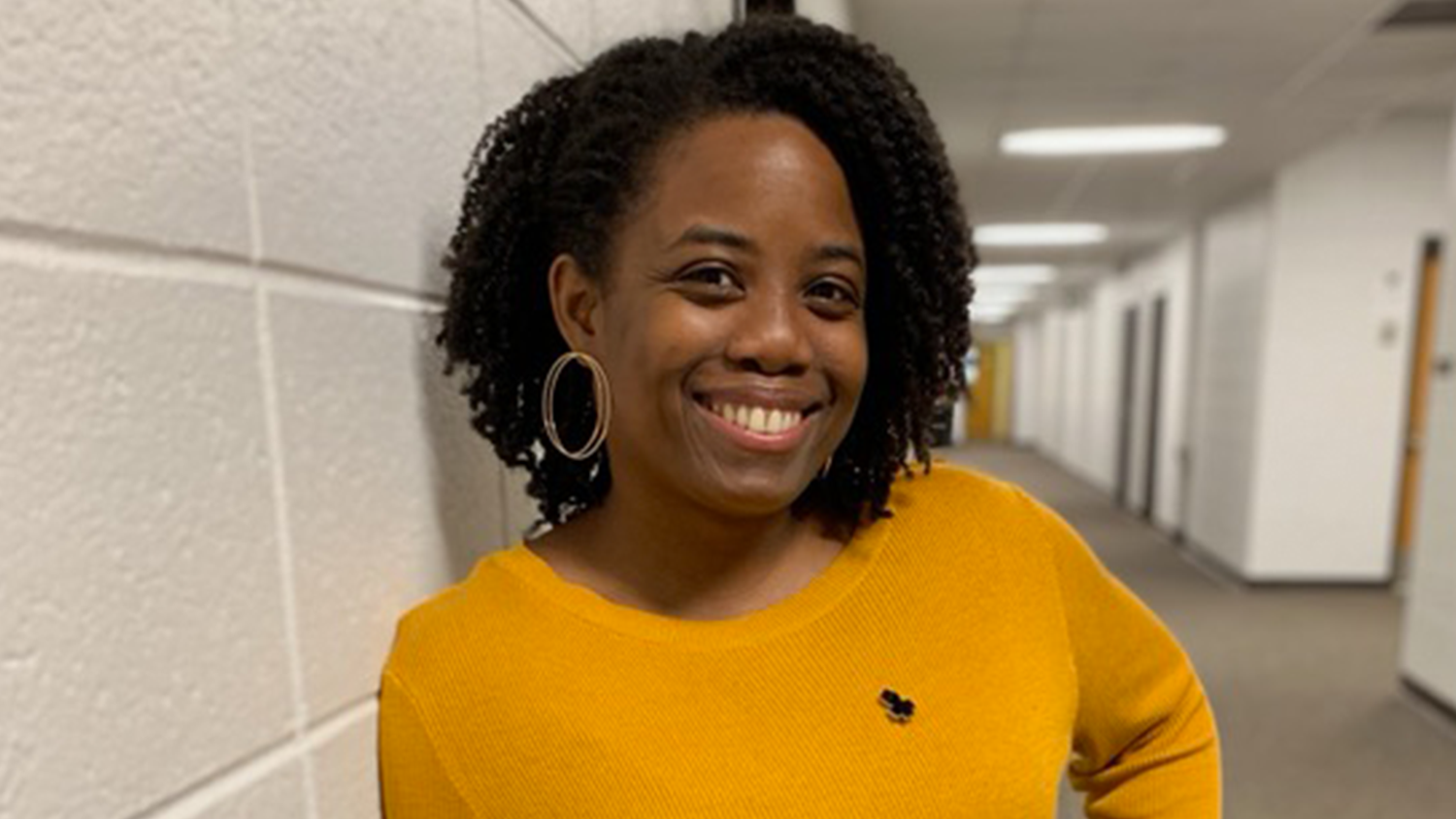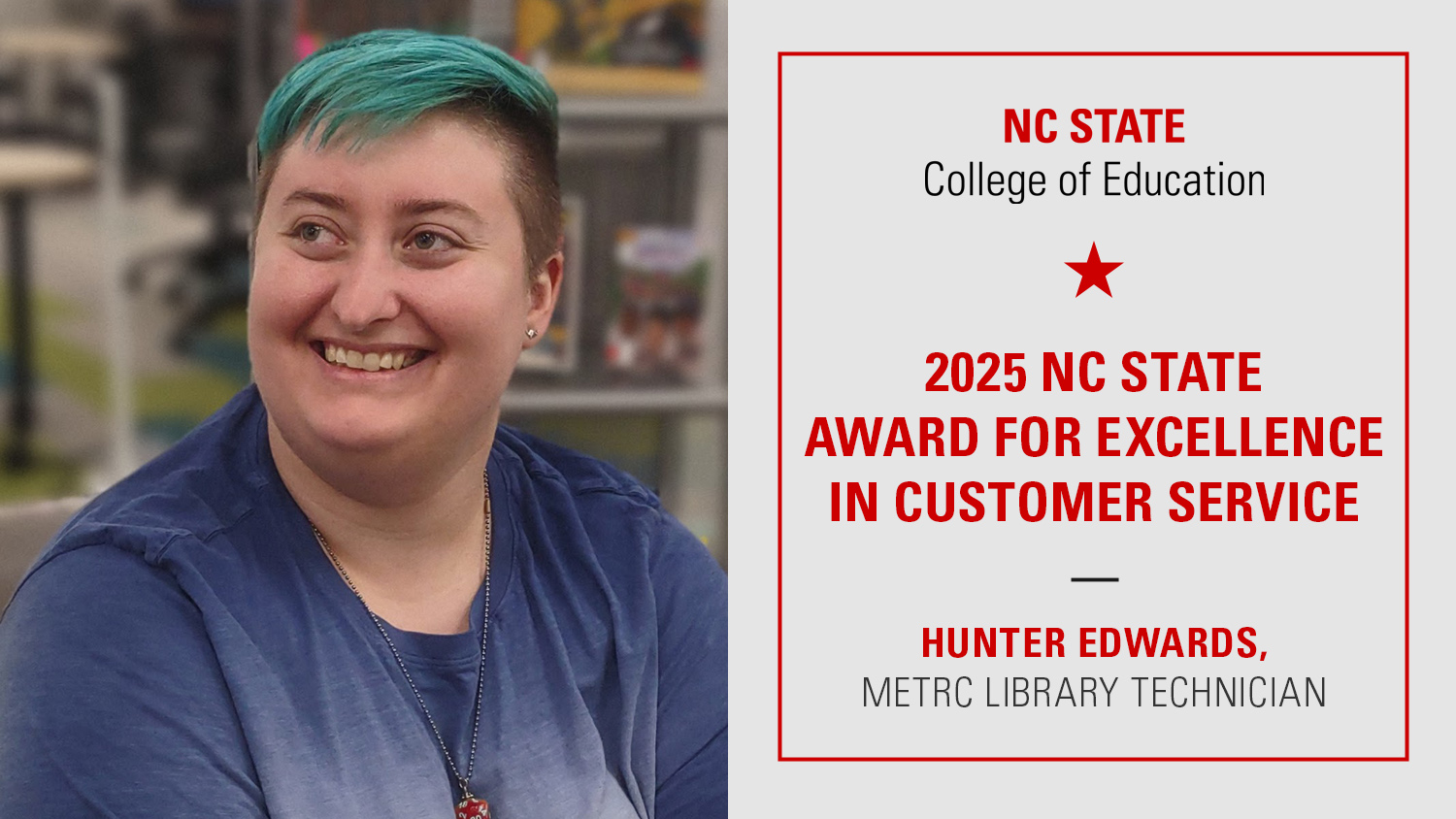Assistant Professor Brean’A Monet Parker On Supporting LGTBQ Students of Color Amid the Coronavirus Pandemic

As the world continues to grapple with the effects of the ongoing coronavirus (COVID-19) pandemic and the renewed attention surrounding critical issues related to racial equity, counselors may find that many students of color who also identify as LGBTQ may be in need of some additional support.
Brean’A Monet Parker, Ph.D., an assistant professor of counseling and counselor education at the NC State College of Education, says that inequities in access to healthcare during the ongoing pandemic have underscored larger racial inequalities that many students of color can face. When those students also identify as LGBTQ, she said, they may face additional stress that can negatively contribute to mental health issues.
“LGBTQ folks of color have to contend with multiple forms of pandemics at this moment. We’re experiencing a global pandemic that we still know very little about, but that disproportionately kills minoritized communities. We are also interrogating anti-Blackness and the racial pandemic taking place,” she said. “This climate, along with the stressors from oppression, are causing LGBTQ Black, Indigenous and other folks of color to have to stress about survival without any lifeboat.”
To help mental health providers provide support to LGBTQ people of color in the current world climate, Parker recently participated in the “LGBTQ+ Young People of Color: Healing from Racism and Cultivating Liberation During COVID-19 and Uprisings Against Anti-Black Racism” webinar, hosted by the Human Rights Campaign and Project Thrive.
Below, Parker discusses ways to support minoritized students, what further research she would like to see in the field and why she is passionate about engaging in this work.
The following Q&A has been edited for length and clarity.
Why is it so important to focus on supporting LGBTQ people of color during the current climate of COVID-19 and anti-racist dialogue?
What has become abundantly clear in this pandemic, and past pandemics, is that when life and death are a priority, the bodies and health of those folks who benefit from white supremacy, colonization and privilege will be valued, protected and affirmed more than everyone else. What we have heard play out across our country is the disparity, inaccessibility and mistreatment towards Black, Indigenous, Latinx and other folks of color seeking treatment for COVID-19. Even more, when we begin to center other minortized identities such as ability status, class, age and sexual and gender identity along with identifying as Black, Indigenous and Latinx, the narratives of denial of quality access, treatment and support during COVID-19 directly reflects how disposable bodies that are not the “default” [can be].
There are emerging data and evidence about the mental and physical health disparities for folks with compounding identities, as a result of complex systems of oppression, and if we do not address them right now, in this moment when we are seeing how systemic and institutional oppression allows bodies to be denied treatment, protection and humanity, then we become part of the problem.
In the webinar, you discuss the issue of pushout, or practices that contribute to students dropping out including unwelcoming and uncaring school environments or policies. How is pushout impacting LGBTQ people of color in education?
Author, educator, civil-rights and social-justice scholar Monique Morris discusses this historical ritual and condition of U.S. education systems pushing out Black girls in her book Pushout: The Criminalization of Black Girls in Schools. Currently, research within K-12 settings are stating that Black and Latinx folks whom are trans, queer or non-binary are experiencing a very similar phenomenon where they are being verbally, physically and sexually assaulted by their peers, teachers and law enforcement. Black and Latinx queer and trans folks within schools experience misgendering, assumption of criminality, promiscuity, racialized sexism and violence. It’s important that we recognize how young trans and queer folks of color are being forced out of institutions and into the juvenile detention and prison systems because of how they are treated inside and outside of the classroom. It’s worthwhile for healthcare systems to explore how they engage in this phenomenon in their practices as well.
How can educators and counselors help Black, LatinX and LGBT students feel that school is a more welcoming place?
[spotlight-box label=”” img=”” heading=”Brean’A Monet Parker Recommends Resources for Educators” cta=”” url=””]
Assistant Professor Brean’A Monet Parker recommends the following resources from scholars, activists, agitators and community leaders of color to help educators create an affirming and humane space for LGBTQ people of color:
- Abolitions Teaching Resources for Agitators
- Abolition Teaching and the Future of Our Schools Welcome Video
- Guide for Racial Justice and Abolitionist Social and Emotional Learning
[/spotlight-box]
Educators and counselors can affirm and support Black, Latinx and other students of color who are queer and trans feel more welcomed at schools by engaging in the work. When I would ask my parents a question, they always told me “go read and find out.” That’s what I’m going to offer. TQPOC students will feel that school is a welcoming place when educators abolish institutional ‘isms’ and fight for sustainable and radical justice for their students. It’s more than just saying you’re an ally, it’s time to do as radical queer Black feminist and social justice scholars have demanded, that we begin to agitate and transform these institutions. As for counselors, we write about the importance of multiculturalism and social justice in our practice, and while that’s a good start we need to take a critical look at how some of our professional history and foundations are steeped in white supremacy, anti-Blackness, colonization, anti-queer and anti-trans treatment and pathologization of disability. We have come a long way, and we have to continue to do our part to abolish teaching and clinical practices that institutionally pathologize post-colonial, post-enslavement, and surviving systemic oppression resistance strategies, coping and concerns as a diagnosis. If you aren’t sure where to start, there are great resources by scholars, activists, agitators and community leaders of color who provide a variety of things you can do right now to begin to create an affirming and humane space for LGBTQ young people of color.
What additional research steps do you believe are needed to better understand the experiences of LGBTQ students of color and help them thrive?
I believe next steps of research require us to center LGBTQ students of color when research is being done with student populations. Chris Linder talks about utilizing a Power-Conscious Approach to address sexual violence on college campuses, and I think this can inspire us, as researchers, to utilize this approach and work with critical theories and frameworks like Intersectionality Theory or Critical Race Theory or LatCrit (just to name a few). Centering, including and collaborating with the voices and narratives or experiences you want to hear from requires us to value the contextual experiences of communities who participate in our research. On that note, we need to ensure that we are not going into communities who are often mined for research and then leaving them behind. Utilizing research methodologies like Youth Participation Action Research (YPAR) or Community-Based Action Research not only allows you collaborate with the community you are working with, it becomes an opportunity for those who are oftentimes the most impacted by your work to become the stakeholders, co-researchers and collaborators in your work and change.
Lastly, other research steps that can help in the other standing of this group is to do a lot of research that illuminates the heterogeneity of this community. Oftentimes trans and non-binary experiences are lumped into lesbian, gay and bisexual (LGB) research. In addition, we need to avoid the temptation to recreate a major racial narrative when the narrative is for specific groups. While there are some similarities between Black, Latinx, Indigenous, Asian American, Desi American and Pacific Islander folks, each group contains heterogenous and contextual situated histories that also need to be explored and stated in the research. Research informs practice and so we have to be mindful and critically intention in how we conduct research.
Why is it important for you to personally engage in this work?
I identify as a Black queer womxn and my personal, familial and cultural history forces me to engage in wanting to seek and to dare to be powerful and use my strength to engage in transformative change. This webinar is just a small cog in a larger wheel in the way I want to work to dismantle and abolish systems that serve to create and maintain various forms of oppression for queer, trans, and non-binary folks of color. I believe I have a lot of privilege, including being here at NC State as an assistant professor in counselor education. I have the educational privilege, capital, speaking ability and cisgender privilege to echo and illuminate the violence and harms professional helpers impose and maintain when we don’t engage in when we refuse to interrogate are participation in systems of oppression.
- Categories:


